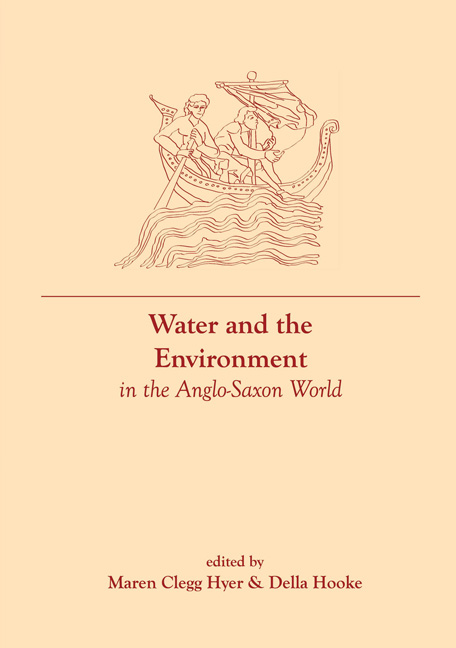Book contents
- Frontmatter
- Dedication
- Contents
- List of Illustrations
- List of Tables
- List of Contributors
- Introduction
- 1 From Whale's Road to Water under the Earth: Water in Anglo-Saxon Poetry
- 2 Water in the Landscape: Charters, Laws and Place Names
- 3 Fens and Frontiers
- 4 Marshlands and Other Wetlands
- 5 Rivers, Wells and Springs in Anglo-Saxon England: Water in Sacred and Mystical Contexts
- 6 Food from the Water: Fishing
- 7 Inland Waterways and Coastal Transport: Landing Places, Canals and Bridges
- 8 Watermills and Waterwheels
- 9 Water, Wics and Burhs
- Notes
- Suggested Reading
- Index
6 - Food from the Water: Fishing
- Frontmatter
- Dedication
- Contents
- List of Illustrations
- List of Tables
- List of Contributors
- Introduction
- 1 From Whale's Road to Water under the Earth: Water in Anglo-Saxon Poetry
- 2 Water in the Landscape: Charters, Laws and Place Names
- 3 Fens and Frontiers
- 4 Marshlands and Other Wetlands
- 5 Rivers, Wells and Springs in Anglo-Saxon England: Water in Sacred and Mystical Contexts
- 6 Food from the Water: Fishing
- 7 Inland Waterways and Coastal Transport: Landing Places, Canals and Bridges
- 8 Watermills and Waterwheels
- 9 Water, Wics and Burhs
- Notes
- Suggested Reading
- Index
Summary
Nis min sele swige, ne ic sylfa hlud
ymb * * * unc dryhten scop
siþ ætsomne. Ic eom swifter þonne he,
þragum strengra, he þreotigra.
Hwilum ic me reste; he sceal yrnan forð.
Ic him in wunige a þenden ic lifge;
gif wit unc gedælað, me bið deað witod.
Not silent is my hall, nor I myself am loud
… for us two the Lord ordained
Our ways together. I am swifter than he
And at times stronger; [he] is more enduring.
Often I rest; he must run on.
With him is my home all my life long.
If we two are parted my death is destined.
Exeter Riddle 85 (Fish and River)The importance of fishing in the later medieval period is well attested and understood. Both freshwater and marine fish were consumed, either fresh or preserved. Freshwater fish ponds were also prominent features of display on religious and secular elite settlements. However, the level of fishing during the Anglo-Saxon period is more complex to decipher. While the remains of fish are generally common on urban settlements of the middle and late Anglo-Saxon period, it was once thought that marine fish were not a common foodstuff until the later part of the late Anglo-Saxon period. This picture is slowly beginning to change as further excavations reveal the presence of fish remains and material remains associated with fishing, as well as evidence from landscape studies. Combining all these different sources of evidence allows us to draw a picture of what constitutes a fishing identity: who were the people fishing and consuming fish? What were they fishing? Where were they fishing and consuming fish? How were they fishing? When were they fishing and consuming fish? Why were they fishing and consuming them? The exploitation of fish in Anglo-Saxon England changes, and it is this change that is important to explore.
Fishing in early Anglo-Saxon England
One of the most obvious pieces of evidence for the consumption of fish is the retrieval of fish bones from settlements. The presence of fish bones on archaeological sites is, however, fraught with problems. Their small size makes them vulnerable to destruction, and if extensive sieving is not conducted during excavation then the bones of larger species such as cod will be recovered in preference to those of smaller but equally important species such as eel and herring.
- Type
- Chapter
- Information
- Water and the Environment in the Anglo-Saxon World , pp. 136 - 151Publisher: Liverpool University PressPrint publication year: 2017



